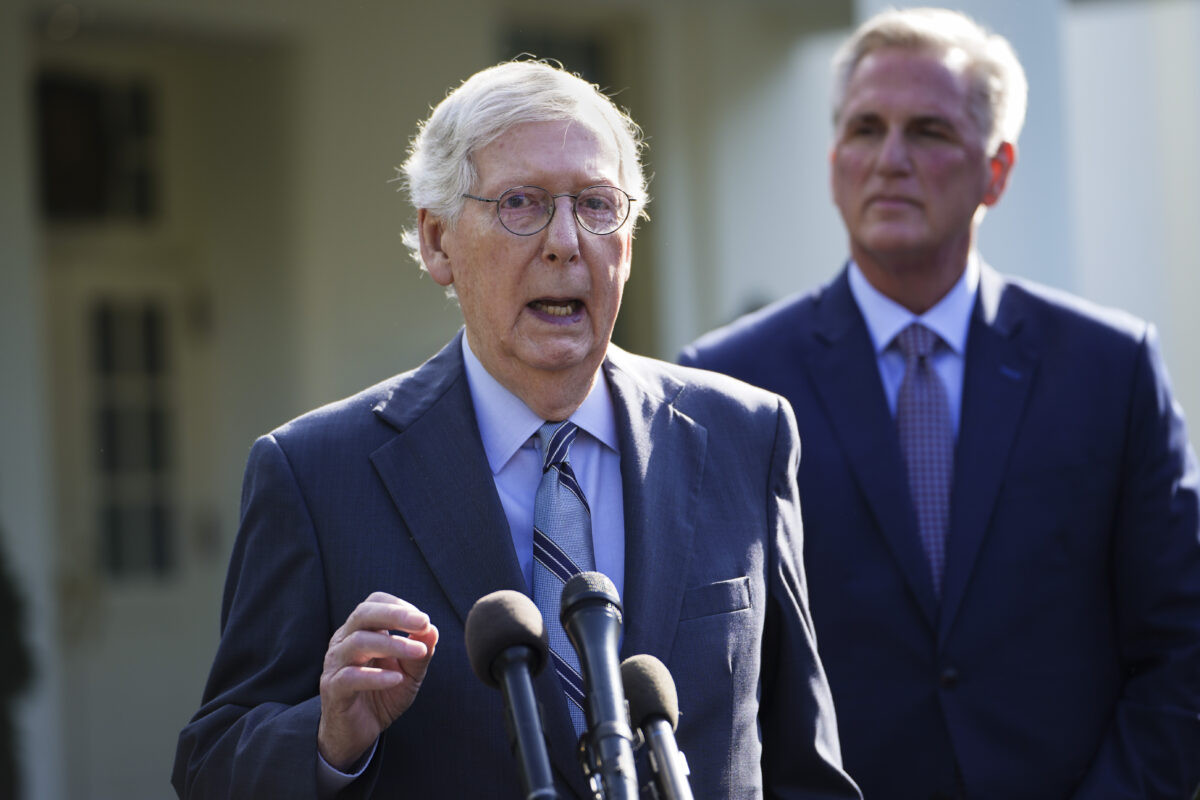

Senate Minority Leader Mitch McConnell (R-Ky.) called on the Senate to pass a debt deal that was brokered by the House speaker and White House, arguing that the United States cannot default.
“The United States of America will not default on its debt,” McConnell said Sunday after President Joe Biden and Speaker Kevin McCarthy (R-Calif.) announced the deal. “Today’s agreement makes urgent progress toward preserving our nation’s full faith and credit and a much-needed step toward getting its financial house in order. I am especially grateful to Speaker McCarthy and House Republicans for their work to ensure that a debt limit increase comes with serious steps to rein in Washington Democrats’ addiction to reckless spending.”
He added that “the agreement the Speaker reached with President Biden sets meaningful limits on the Administration’s spending agenda. At the same time, it secures permitting reforms and reinforces the link between federal assistance and work.”
But McConnell’s statement comes after Sen. Mike Lee (R-Utah), Sen. Rand Paul (R-Ky.), and several other GOP lawmakers said they wouldn’t block the measure. They noted that McCarthy’s deal would include a reported $4 trillion raise to the debt ceiling over the next two years.
In an interview Sunday, McCarthy cast the deal as a win for Republicans and a loss for Democrats, as Republican lawmakers said the spending cuts don’t go far enough.
“Right now, the Democrats are very upset. The one thing [Hakeem Jeffries] told me, there is nothing in the bill for them—there is not one thing in the bill for Democrats,” McCarthy during a “Fox News Sunday” interview.
Sen. Ted Cruz (R-Texas) said that “there’s not ‘one thing’ for Dems. There are $4 trillion things—a blank check—for Democrats. Plus 87,000 things: new IRS agents to harass Americans. All in exchange for eliminating virtually ALL of the House’s spending cuts,” Cruz wrote in a tweet Sunday. And Lee, for instance, wrote that he would “use every procedural tool at my disposal to impede a debt-ceiling deal that doesn’t contain substantial spending and budgetary reforms.”
The deal, announced over the past weekend, was agreed to in principle by the White House and McCarthy. It still needs to pass the House and the Senate.
McCarthy said the House will vote on the legislation Wednesday, giving the Senate time to consider it before June 5, the date when Treasury Secretary Janet Yellen said the United States could default on its debt obligations if lawmakers did not act in time.
As part of the deal, the pause on student loan payments that was enacted during the COVID-19 pandemic is now “gone” as the U.S. Supreme Court hears a case challenging the policy.
“The pause is gone within 60 days of this being signed. So that is another victory because that brings in $5 billion each month to the American public,” McCarthy told Fox News. “What the president did, he went unconstitutionally and said he was going to waive certain people part of their debt for student loan[s], but then he paused everybody’s student loan. So everybody who borrowed a student loan within 60 days of the signing is going to have to pay that back,” he added.
The agreement would keep nondefense spending roughly flat in the 2024 fiscal year and increase it by 1 percent the following year, as well as suspend the debt limit until January 2025—past the next presidential election. For the next fiscal year, the bill matches Biden’s proposed defense budget of $886 billion and allots $704 billion for nondefense spending.
The bill also requires Congress to approve 12 annual spending bills or face a snapback to spending limits from the previous year, which would mean a 1 percent cut. The legislation aims to limit federal budget growth to 1 percent for the next six years, but that provision would not be enforceable starting in 2025.
Republicans targeted money that the IRS was allotted last year to crack down on tax fraud. The bill bites into some IRS funding, rescinding $1.4 billion.
The announcement came after Yellen last week announced that the federal government won’t be able to pay its bills unless Congress raises the ceiling by June 5, according to a letter she wrote to members of Congress on May 26. The Treasury will make scheduled payments of more than $130 billion on June 1 and 2, which include payments to veterans, she wrote (pdf).
“If Congress fails to increase the debt limit, it would cause severe hardship to American families, harm our global leadership position, and raise questions about our ability to defend our national security interests,” Yellen wrote, adding: “I continue to urge Congress to protect the full faith and credit of the United States by acting as soon as possible.”
Since the federal government hit the borrowing cap in January, the Treasury Department has been forced to rely on extraordinary measures to pay its bills until the debt ceiling is raised or suspended.
The Associated Press contributed to this report.




Discount Applied Successfully!
Your savings have been added to the cart.